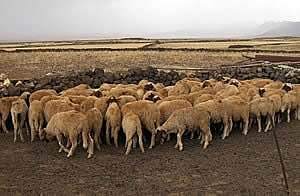 |
|||||||||
|
|||||||||||||||||||
|
|
Outbreak of 'Peste des Petits Ruminants' in Morocco FAO is helping Morocco deal with an outbreak of peste des petits ruminants (PPR) that threatens to kill millions of sheep and goats and could possibly spread to neighbouring countries.
The outbreak has largely affected sheep, with 133 outbreaks in 29 provinces so far. PPR is a viral and very contagious disease of domestic goats and sheep and small wild ruminants. It is transmitted through close contact between animals. In its acute form it is characterized by high fever, discharges from the eyes and nose, sores in the mouth, lesions of the mucous membranes, laboured breathing, and diarrhoea. Mortality rates can reach 80 percent in acute cases. In “super acute” cases the mortality rate is 100 percent, with affected animals dying in the first week. This is the first ever occurrence of the disease in Morocco, which indicates that PPR has now crossed the natural barrier of the Sahara and poses a risk to North Africa. The origin of the outbreaks is currently unknown, but it is possible the disease was introduced through the movement of live, infected animals. For North African countries, the control of animal movements over borders is difficult, especially in the southern part of the region where herders follow a nomadic lifestyle. Risk of spread Morocco’s sheep population is 17 million and its goat population is 5 million. These animals play an important role in supporting the livelihoods of millions of families. With the holy month of Ramadan having begun in September, and the Eid Al-Adha celebration in December, trading in livestock, particularly sheep, will increase markedly in North Africa. Without proper control mechanisms, this could accelerate the spread of the virus, FAO warns. These outbreaks can lead to serious economic losses, aggravated by imposed sanitary measures, controls on livestock movements, and trade restrictions. Risk is also high for southern European countries that maintain close trade relations with Morocco, Spain in particular. “In the event that the present scenario evolves to higher mortality, the livelihoods of the affected herders would severely be at risk. The economic impact might not be as great as in the case of rinderpest in cattle, but the social impact would be greater, considering the role played by small ruminants in the social life of the affected communities,” warned FAO Chief Veterinary Officer Joseph Domenech. FAO’s response Responding to a request for assistance from Moroccan authorities, FAO fielded a rapid response mission by the FAO/OIE’s Crisis Management Centre - Animal Health (CMC-AH) from 12-21 August 2008. The team assisted with the establishment of urgent measures to control and limit the spread of the disease. FAO’s Emergency Centre for Transboundary Animal Diseases (ECTAD) convened an urgent two-day meeting of all Chief Veterinary Officers from the Maghreb region on 29-30 August in Tunisia. They agreed to assist Morocco in its efforts to fight the PPR outbreak and requested that FAO help Moroccan authorities prepare an emergency preparedness plan, ensure its implementation, and enhance coordination among the veterinary services of the Maghreb and with the veterinary services of neighbouring southern European countries. FAO is now mounting an urgent regional technical cooperation project in response. Containment steps Prevention and control measures for PPR recommended by FAO include animal movement control, institution of quarantine on affected or suspect farms, and medical prophylaxis (vaccination around field outbreaks and in high risk areas). Regarding the situation North Africa, the UN agency is also recommending that countries:
|
||||||||||||||||||

|
|
||||||||||||||||||
| home | agri-services | pedigree
pen | news | dairy | beef | machinery BPS | property | organisations | site map |
|||||||||||||||||||



